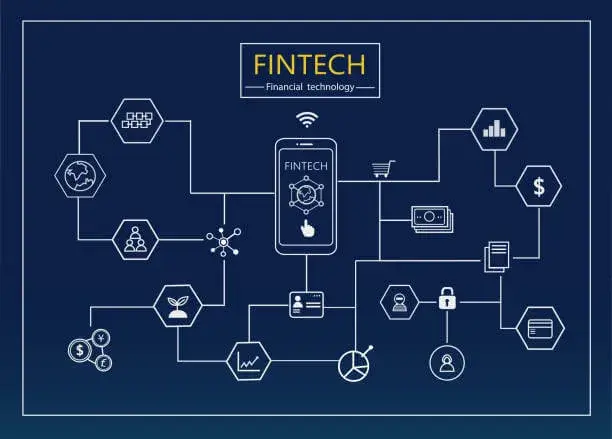Fintech combines the two words, i.e., Finance and Technology. It is a technological solution to pre-existing financial systems.


We are listing the 41 Companies that have raised 150Bn dollars. These companies have touched the future fintech stock forecast already. The listed down below 41 companies are all unicorns. They have reached a valuation of $1Bn and they are working in the following spaces:
These industries are already cash-heavy, and have everything to gain from going digital. Some solve obvious problems like improving transparency in international transactions.
While others take new approaches to traditional processes. These approaches can be lending/borrowing, instant-billing, and self-management, etc. This leads us to think that fintech is a good career.
This is only the literal tip of the iceberg; billions of investments are making in the fintech sector. As it is the most likely to revolutionize the way we handle money.

Investments come with a varying scale of risks that coincide with an investor’s risk profile. The purpose is to create a certain tumultuous atmosphere. So, the investment could keep out of the hands of the average professional.
Even the most daring future of the fintech investors need bits of information. Yet, investors gather data/info before making any financial decisions. This leads us to leverage Cloud and AI to help boost efficiency and improve access.
One of the biggest issues plaguing investment banking is compliance. Keeping up with regulatory change can hinder. Even inhibit innovation as it is quite the challenge. When becomes essential to keep updated systems according to new compliance requirements.
This can lead to organizational fatigue as well as a drop in productivity. With platform implementations and cloud migrations, financial institutions can finally breathe free. Moreover, they can start thinking ahead of mere compliance.
By embracing cloud computing for central databases, network systems can achieve more agility. Also, the cloud connects the ecosystem that relies on digital infrastructure. Great isn’t it!
To address any concerns about security or safety, data warehouses such as Amazon’s are encrypted using 256-bit bank-level encryption. Which would take a hacker a few billion years just to guess, and copies of the database are kept in 3 separate secure locations, just in case something were to happen (natural calamity or human error, etc.).
Cloud computing brings us to:
Moreover, partnering with tech companies can help with managed services. Also, in platform implementations, resource and staff augmentations, it can help-out.
Venturing into AI helps build predictive models. Such models are becoming adept at understanding the financial market. Further, it helps in making informed decisions with precision.
In conclusion, the future of fintech stock is growing at a high level. You will see more and more investors and stockers taking an interest in it.
Taxation, personal management, savings, short-term investments, running a company become easier. Through finance apps, companies can compress complicated financial processes into simple windows. Not only that, they can check while focusing on the critical things and maintain them.
There is a famous case study for the country of Mexico. The land of Mexico where a lack of financial culture had once. So, the people had started saving their money. Can be on their person, or at home, outside of any financial institutions.
This was because of the stem from a lack of widespread financial knowledge. It inhibits the ability to apply any financial solutions to their wealth. This leads to people using informal savings and credit methods. Even, schemes that may represent a risk to their assets.
Talking with evidence or facts, only 47% of adults in Mexico have a bank account. While 68% have at least one financial product. In contrast, Mexico has an internet spread of approximately 70%. Fintech solutions are priming to bridge that gap.
These fintech companies usually stand out for three elements. Which entails operational efficiency, reduced costs, and open access to free scheduling. Some of these companies are:
Companies that grant the personal loan. Along, the advantage of lower interest rates than traditional banking, and fewer prerequisites.
This refers to movements such as payments, transfers, and purchases.
These focus on advising the user to make better use of their money. also, they help diagnose customers on their financial situation. Sometimes, they offer alternatives to help pay off debts, improve savings.
Even, they provide hire services. Which entails insurance or loans; that is, they act as virtual financial advisors. So, the future of fintech in finance is growing at a faster rate.
If we were locked in our homes like the 1990s. Society would have brought to a violent and immediate halt. This is because there was no live streaming education, no means of consuming dinner via proxy. Healthcare options were nowhere to see, and no amount of money.
So, in short, we were not able to prevent calamity. Yet, with modern-day fintech, we are able to live some normal life. We went shopping, eating, hoteling, etc. With fintech, we can transact huge sums of money without having to interact with anyone.
During COVID-19, most fintech went into overdrive to respond to the crisis. Insurtech and pro-tech companies started shoring up their capital. They are getting more funding from investors and lenders alike.
Other fintech started implementing cost-saving measures, including workforce reduction. This was because of a priority strategy. This ensures as many expenses as possible are variable while fixing expenses.
For insurtechs, winning the attention of investors is getting even more difficult. given the number of startups already in the market. Also, attracting end-users likely won’t be any easier. As insurers shift their focus to immediate needs and expense management COVID-19 outbreak.
Current market conditions and social distancing practices have also affected protects business growth. Also, many of those investing in real estate is being forced to pause their activities.
Until it is clear that they will be able to sell the properties. Other protect, to keep their customers, are offering discounts and attractive retention offers.
Beyond these more general finance and operating considerations, one can explore more. As different category of fintech is responding to some unique challenges.
Many online lenders, for instance, are tightening their underwriting standards. To keep the quality of their balance sheets and mitigate any potential rise in defaults.
They may also soon find that the historical data they use to make underwriting decisions could be less reliable. So, in today’s environment, and they will have to adjust their models.
The landscape has been changing at a fast rate. Since Amazon has made it possible for online shoppers to gain items within minutes. This ease of business is building on the foundation of easy fintech solutions.
Since COVID-19, the industry has improved even more. Here are some major opportunities for FinTech’s moving forward.
As an e-commerce business grows, so too its vulnerabilities. This is why E-Commerce platforms are starting to adopt KYC. E-Commerce makes more goods available to more people.
Regardless of where the company or the customer is. Early fintech helped establish the pathway that E-Commerce-focused solutions are taking now.
SWIFT GPI made it easier for banks to manage and trace these payments. GPI is a global positioning integration. In early 2019, SWIFT announced a specific GPI link for eCommerce. It includes the plans to use R3’s blockchain technology.
While much of the focus is on supporting bank payments and activities. Such shift provides an opportunity for large E-Commerce brands, those near country borders.
As these platforms become available, a company may not need a presence in another country. They also don’t need to expand their reach.
Fast, affordable payment management could make it easier for E-Commerce companies. So, they can work with a variety of payment providers. For both their interactions with customers as well as supply chain partners.
Fintech simplifies cross-border payment management. With fintech, it becomes easier for E-Commerce to expand. Even beyond greater boundaries or choose where to have fulfillment locations.
One of the more exciting fintech innovations for E-Commerce companies in nearby stores. A well-known example comes from the Oxxo convenience stores in Mexico. More than half of Mexico’s shopping population lack bank accounts, but they still want to shop online. So, they make a sale from select online merchants.
After that, they go to their nearby Oxxo store and pay for the products they selected. Enabling someone who only has physical cash and no bank account can buy goods only sold online.
It’s a “low-tech” solution that takes innovative fintech to pursue. It’s also a rich opportunity at a very high level. According to 2017 data, there are about 1.7 billion unbanked adults in the world.
There’s a good chance, yet, that this group overlaps with the ever-growing number of Internet users. The growth is about 4.54 billion as of January 2020.
We know about two-thirds own a phone. So, as these consumers shift to smartphones and gain access. Thus, there’s a big place for fintech to support eCommerce growth.
Ecommerce relies on a large level on the logistics sector. These are both interested in fintech at diverse locations for every sale. There are problems with all the financial movement of payments.
The same goes for insurance and product handoffs. There are a lot of opportunities for receipts and bills, get miss out during processes. Sometimes it is accidental, and other times fraud.
Fintech services that aim to automate payment processing during handoffs can protect everyone. This potential is growing with the adoption of more supply chain DLT offers.
Ecommerce companies become part, as fulfillment partners, suppliers, and manufacturers join such blockchains. We can say that innovation in payments future in fintech for sure.
This cost-reduction and risk mitigation is often felt most by the carrier. The move into E-Commerce is likely going to be more driving.
As the field is getting more carriers and logistics partners. Hope our information can provide you with the details information of the fintech.
Top quality ensured or we work for free
